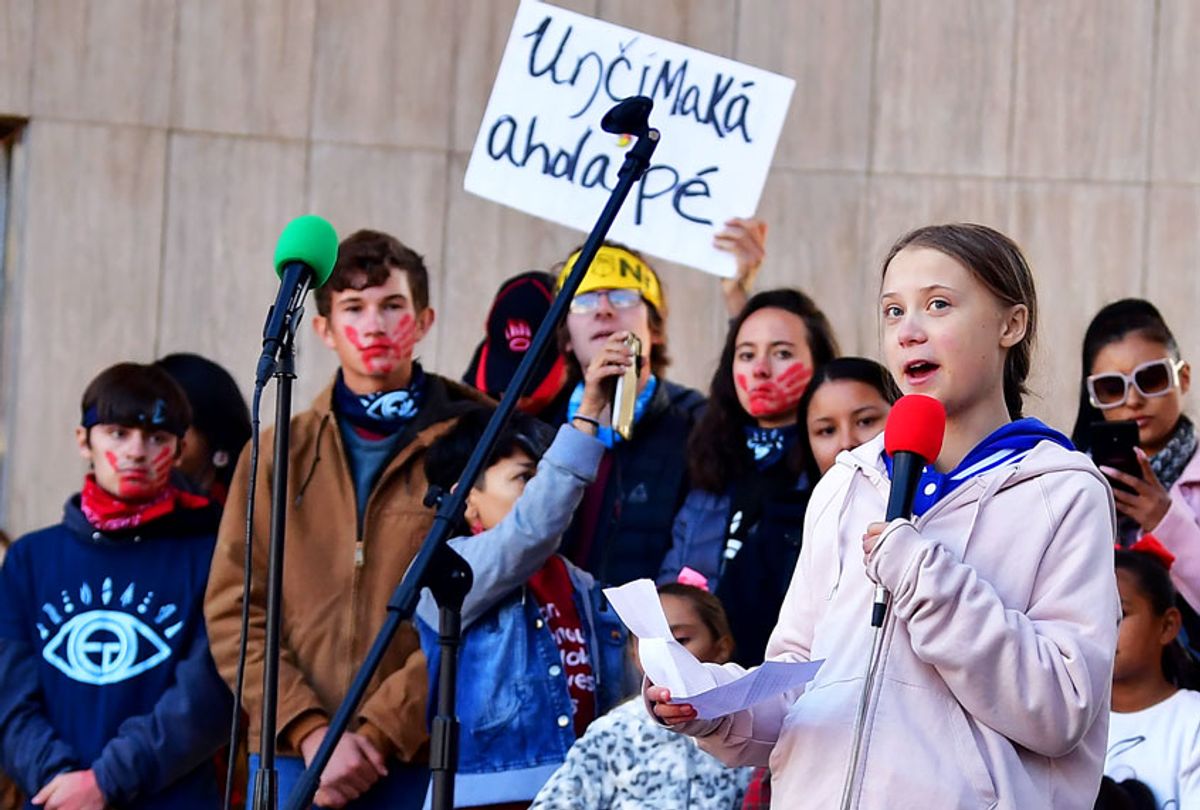The largest rally so far during the presidential campaign, in the first state to vote, was led by 16-year-old Swedish climate activist Greta Thunberg and a teenage crew of Iowa City climate strikers.
That should be a wakeup call to Democratic presidential candidates — and even President Trump.
In fact, according to most estimates, the youth-led climate strike in Iowa City in October — coming off a year of unrelenting weekly protests — dwarfed the largest turnouts so far for Sen. Bernie Sanders, flanked by rising Democratic star Alexandria Ocasio-Cortez; emerging Iowa frontrunner Pete Buttigieg; and former Secretary of State John Kerry, campaigning on behalf of Vice President Joe Biden.
There's more: The young climate voters in Iowa aren't just turning out. They are organizing and mobilizing on a timeline set by global scientists for drastic reductions in carbon dioxide emissions that transcends political parties or Democratic campaigns.
Galvanized by the fact that global carbon emissions have increased by 4 percent since the last presidential election, youth climate activists have upended politics by forcing Democrats to meet their climate agenda, instead of kowtowing to a Democratic Party establishment that refused to host a debate on climate change.
The year-long wave of the student climate strikes has spread across the state, the rise of the take-no-prisoners Sunrise Movement has interrupted speeches, carried out sit-ins and hammered down commitments to the Green New Deal from every major candidate, and myriad grassroots voter registration efforts have forced every Democratic candidate to present climate plans that would have been unthinkable a few years ago.
Beyond their numbers, young people in Iowa have made attention to the climate crisis a litmus test for candidates. In the process, they have changed the climate narrative in all the Democratic presidential campaigns — and have even reached the tweeter in chief in the White House.
After Trump's mocking tweets about Thunberg's appearance at the UN climate summit in the fall, the Swedish teen told Iowa reporters that Trump and other leaders want to "silence" young climate activists because "they can sense that we are making an impact."
Here's why that matters in Iowa: Our antiquated system of voting in person at the caucus, which requires an entire evening of someone's time, hinges on dedicated and organized campaigns. Before we vote, we mingle with our neighbors, listen to campaign pitches and experience the messy process of democracy.
As Time Magazine's Person of the Year, Thunberg understands this persuasive role of youth well. So do the student climate strikers in Iowa City, who have already forced the "adults in the room" to pass climate emergency plans in their local school district, the city council and even on the university level, in line with the UN's Intergovernmental Panel on Climate Change goals to cut CO2 emissions by 45% by 2030.
The polar-vortex reality of early February in Iowa, which keeps the fair-weather voter at home, is a mild distraction to climate activists worried about a recent study by 11,000 scientists warning of "untold suffering" without immediate and radical action to address our climate emergency.
This year's election even adds a greater incentive: A new law in Iowa allows 17-year-olds to vote in the February caucus if they will turn 18 before the November general election. That has added thousands of energized first-time voters to their ranks, and they don't plan to be silenced, in Thunberg 's terms.
Nationwide, voters under 34 years of age made up 67% of the newly registered ranks.
In the 2018 midterm elections, young voters aged 18-24 accounted for just under 10% of the vote.
In the upcoming Iowa Democratic caucus, that group will command an undeniable clout as the most powerful swing vote.
That swing vote, of course, is not monolithic in its choice of candidate, though it clearly leans to the left. In a straw poll in late October, Sanders dominated with a quarter of the youth vote in Iowa, with Elizabeth Warren, Biden and Buttigieg sharing a distant second tier.
Let's put this in perspective: In the last days leading up to the 2016 Iowa caucus, less than half of the voters considered climate action by the federal government to be a priority in an ABC News poll.
Three years later, seven out of 10 voters in Iowa — Democrats, Republicans and independents — want to see a more hands-on climate plan coming out of Washington.
Last spring, a poll ranked climate action at the top of issues for 80% of Iowa Democrats, even ahead of health care.
This shift, of course, is partly due to several historic floods that have swamped the state from the Missouri to the Mississippi River, bringing the costly impact of climate destabilization home to rural farmers and urban dwellers alike. A study released earlier this year by the Iowa Policy Project found that "Iowa and the Upper Midwest have a much clearer trend in annual precipitation than the whole of the contiguous U.S."
But floods don't inspire voters. Great climate plans do. And climate youth activists will mobilize those voters to the caucus rooms.
In addressing the UN climate summit in Madrid this week, Thunberg declared: “In just three weeks we’ll enter in a new decade which will define our future. Now we are all desperately looking for a signal of hope. And I can tell you that there’s hope, I’ve seen it. But it doesn’t come from governments or corporations, it comes from the people.”
It will also come in the Iowa caucus, if youth climate activists have their way.



Shares